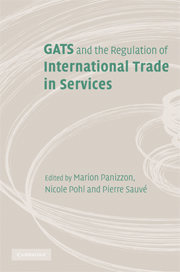Book contents
- Frontmatter
- Contents
- Contributors
- List of figures
- List of tables
- List of abbreviations
- Preface
- PART 1 Beyond regulatory control and multilateral flexibility: Gains from a cosmopolitan GATS
- PART 2 Unexplored economic, political and judicial dimensions of GATS
- PART 3 The limits of request–offer negotiations: Plurilateral and alternative approaches to services liberalisation
- PART 4 GATS case law: A first assessment
- PART 5 Market access, national treatment and domestic regulation
- PART 6 Unfinished business: Safeguard and subsidy disciplines for services
- PART 7 Challenges to the scope of GATS and cosmopolitan governance in services trade
- 22 Trade rules for the digital age
- 23 Comment: Digital trade: Technology versus legislators
- 24 How human rights violations nullify and impair GATS commitments
- 25 Comment: The instrumental rationale for protecting human rights in the context of trade services reform
- 26 In pursuit of the cosmopolitan vocation for trade: GATS and aviation services
- PART 8 Conclusion
- Index
- References
24 - How human rights violations nullify and impair GATS commitments
from PART 7 - Challenges to the scope of GATS and cosmopolitan governance in services trade
Published online by Cambridge University Press: 03 September 2009
- Frontmatter
- Contents
- Contributors
- List of figures
- List of tables
- List of abbreviations
- Preface
- PART 1 Beyond regulatory control and multilateral flexibility: Gains from a cosmopolitan GATS
- PART 2 Unexplored economic, political and judicial dimensions of GATS
- PART 3 The limits of request–offer negotiations: Plurilateral and alternative approaches to services liberalisation
- PART 4 GATS case law: A first assessment
- PART 5 Market access, national treatment and domestic regulation
- PART 6 Unfinished business: Safeguard and subsidy disciplines for services
- PART 7 Challenges to the scope of GATS and cosmopolitan governance in services trade
- 22 Trade rules for the digital age
- 23 Comment: Digital trade: Technology versus legislators
- 24 How human rights violations nullify and impair GATS commitments
- 25 Comment: The instrumental rationale for protecting human rights in the context of trade services reform
- 26 In pursuit of the cosmopolitan vocation for trade: GATS and aviation services
- PART 8 Conclusion
- Index
- References
Summary
Introduction
Similarly to the United Nations, which considers gross human rights violations a threat to peace, the WTO should regard the effect of certain human rights violations as a restriction on multilateral trade liberalisation. Economic damage done to cross-border services trade by human rights restrictions results in the sending WTO Member no longer benefiting from the negotiated levels of the modal and sectoral commitments under GATS. Human rights violations may have a trade-restrictive effect when service suppliers, including investors, lose trading opportunities abroad. The DSU non-violation nullification and impairment instrument is the tool to redress the devaluation of a tariff reduction or of services market access commitment even in the absence of an outright violation of WTO treaty law. Thus, where a measure restricts human rights to the point that the violation affects and impairs mutually agreed GATS commitments, a non-violation type complaint offers a ground for legal action, not so much because non-WTO law has been violated, but because economic damage has been done. Some WTO Members may justify restricting the human rights of foreign service providers as being legitimate in terms of the security or public order exceptions to services liberalisation provided for in Article XIV GATS. In a twist on traditional human rights and trade doctrine, this chapter argues that protection of human rights is favourable to trade liberalisation.
- Type
- Chapter
- Information
- GATS and the Regulation of International Trade in ServicesWorld Trade Forum, pp. 534 - 560Publisher: Cambridge University PressPrint publication year: 2008
References
- 4
- Cited by



